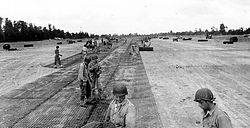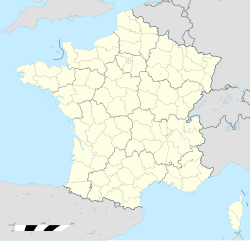Beuzeville Airfield
| Beuzeville/Ste Mère Eglise Airfield Advanced Landing Ground (ALG) A-6 |
|||||||
|---|---|---|---|---|---|---|---|
| Manche, Basse-Normandie Region, France | |||||||

810th Engineering Aviation Brigade constructing Beuzeville/Ste Mère Eglise (A-6), France
|
|||||||
| Coordinates | 49°25′22″N 01°17′39″W / 49.42278°N 1.29417°WCoordinates: 49°25′22″N 01°17′39″W / 49.42278°N 1.29417°W | ||||||
| Type | Military Airfield | ||||||
| Site information | |||||||
| Controlled by |
|
||||||
| Site history | |||||||
| Built by | IX Engineering Command | ||||||
| In use | June–September 1944 | ||||||
| Materials | Square-Mesh Track (SMT) | ||||||
| Battles/wars |
|
||||||
| Garrison information | |||||||
| Garrison |
|
||||||
| Occupants |
|
||||||
| Airfield information | |||||||
|
|||||||
| One runway, 4 alert pads, 50 hardstands | |||||||
Beuzeville/Ste Mère Eglise (Beuzeville) Airfield is an abandoned World War II military airfield, which is located near the commune of Beuzeville-au-Plain in the Normandy region of northern France.
Located just outside Beuzeville-au-Plain, the United States Army Air Force established a temporary airfield shortly after D-Day on 7 June 1944, shortly after the Allied landings in France The airfield was one of the first established in the liberated area of Normandy, being constructed by the IX Engineering Command, 819th Engineer Aviation Battalion.
Known as Advanced Landing Ground "A-6", the airfield consisted of a single 5000' (1500m) Square-Mesh Track runway aligned 05/23. In addition, tents were used for billeting and also for support facilities; an access road was built to the existing road infrastructure; a dump for supplies, ammunition, and gasoline drums, along with a drinkable water and minimal electrical grid for communications and station lighting.
Construction of the airfield began on the morning of June 8, when an advanced element stronger than fifty men began work at about 10:00 a.m. After a day of hard work almost in the heart of the fighting during which the battalion will lose 7 men, the runway was almost ready. The presence of snipers and enemy aircraft at night prohibit night work. First the land is put to the standard R & R (refueling and rearming). In this configuration, it ended 14 June Nevertheless, from the June 10, 3 spitfires a Polish squadron of the 2nd Tactical Air Force British had already laid on the ground. The first American plane landed there on 11 the same day, 5 Waco gliders filled with ammunition and reinforcements to the 82nd Airborne also present there. The next day a drop of more than 20 tons of ammunition occurs above the airfield. The rest of the battalion joined the media company on 11 and 12 June.
...
Wikipedia

